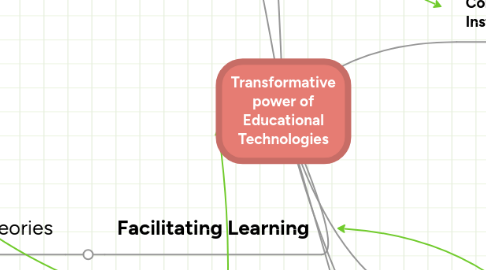
1. Beginning of Educational Technology
2. Soft Technology
2.1. Framework
3. Facilitating Learning
3.1. Learning Theories
3.1.1. Behavorism
3.1.1.1. Stimuli, responses, & reinforcers
3.1.1.2. 1960-1970: Teaching Machines & Programmed Instruction
3.1.1.3. Programmed Tutoring
3.1.1.3.1. Practice Exercises
3.1.1.3.2. Social Reinforcers
3.1.1.3.3. Coaching
3.1.1.4. Direct Instruction
3.1.1.4.1. Scripted
3.1.1.4.2. Small Group
3.1.1.4.3. Fast
3.1.1.4.4. Constant Interaction Student/Teacher
3.1.1.5. Personalized System of Instruction (PSI)
3.1.1.5.1. Sequential Units
3.1.1.5.2. Learner moves at their own pace
3.1.1.5.3. Competency Test to move on
3.1.2. Cognitivism
3.1.2.1. Explain internal mental function through scientific methods
3.1.2.2. Use memory & thought processes to generate strategies, store & manipulate mental representations & ideas
3.1.2.3. Piaget's Theory
3.1.2.3.1. assimilation
3.1.2.3.2. accomadation
3.1.2.4. Information Processing Theory
3.1.2.4.1. learning as a series of transformations through mental processes
3.1.2.4.2. focuses on how information is stored in memory
3.1.2.5. Schema Theory
3.1.2.5.1. Memory is stored in changeable, abstract structures
3.1.2.6. Neuroscience
3.1.3. Constructivism
3.1.3.1. Knowledge is Created by the Learner
3.1.3.2. Contructivist Presciptions
3.1.3.2.1. real-world , complex, & relevant environments
3.1.3.2.2. social negotiation
3.1.3.2.3. multiple perspectives & modes of representation
3.1.3.2.4. ownership in learning
3.1.3.2.5. self-awareness of learning process
3.1.3.3. Situated Cognition
3.1.3.3.1. Context Specific
3.1.3.4. Anchored Instruction
3.1.3.4.1. Creates a Context (or anchor) for Learning
3.1.3.5. Problem-based Learning
3.1.3.5.1. First hand involvement in problem solving
3.1.3.6. Collaborative Learning
3.1.3.7. Can frustrate novice learners bc of mental overload
3.1.3.8. Best for complex or advance learning goals
3.1.4. Eclectic Perspective
3.1.4.1. Combines principles from different theories
3.1.4.2. Chose principles based on task & learner
3.1.4.3. Learner Centered
3.1.5. Informal Learning
3.1.5.1. Websites
3.1.5.2. Media
3.1.5.3. Everyday Life
4. "Educational technology is the study and ethical practice of facilitating learning and improving performance by creating, using, and managing appropriate technological processes and resources."
4.1. New node
4.2. New node
5. Computer-Assisted Instruction
5.1. Mostly drill & practice
5.2. Computer program adapts to user's answers
6. Presentation
6.1. Organization of Content
6.2. Digital Multimedia
6.2.1. Presentation of information in multiple forms
6.3. Audiovisual Media
6.3.1. Stimulate multiple senses
6.3.2. Visual Literacy
6.4. Learning Styles
6.4.1. Visual
6.4.2. Auditory
6.5. Meaningful, comprehensible, memorable, & appealing
6.6. Phases of Presentation
6.6.1. Gaining & Focusing Attention
6.6.2. Linking Prior Knowledge
6.6.3. Organizing Content
6.6.4. Assimilating new Knowledge
6.6.5. Strengthening Retention & Transfer of New Knowledge
